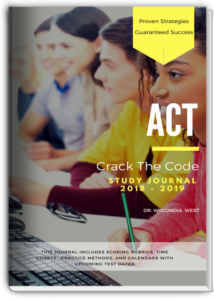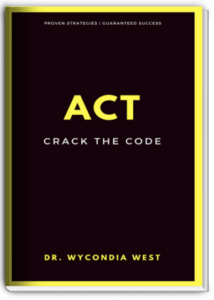I have the pleasure of working with so many students who are striving to increase their ACT scores. Unfortunately, students show up to my ACT classes on various academic levels. Some students have a plethora of skills, while others tend to lack basic skills that will guarantee success. Nevertheless, the great equalizer among students is the math section on the ACT. It is evident that students are waiting until their junior and senior year to get serious about the ACT. This is dangerous because they run the risk of forgetting basic pre-algebra, algebra, and geometry skills. Lacking these essential skills can make the math section extremely difficult for the brightest scholar.
I would urge students to get serious about the ACT no later than 10th grade. Even further, it would be wise for students to start prepping and taking the test in 9th grade. Testing early and testing often would guarantee success before senior year. I hate to see these students frustrated during their senior year. Let’s encourage them to start working towards a higher ACT score no later than 9th grade. This will give them plenty of time to work on any deficient math skills. ACT Up!
Facts and Myths about the ACT exam!
Life can be so uncertain. For instance, you might have to travel with your family during a critical time like the ACT exam. Don’t worry! Don’t cancel the trip! Don’t cancel the exam! You can make both the trip and the test happen. Let’s clear up this one misconception about the ACT.
Myth: You have to take the ACT exam in your hometown.
Fact: You can take the ACT exam anywhere it’s offered.
Example: If you live in Florida, but your family will be vacationing in Tennessee on test day, you can simply select a testing spot in Tennessee. In fact, the ACT is offered in the states, U.S. territories, Puerto Rico, and Canada. If you live outside of those areas mentioned, you would need to find an international testing site. -Dr. Wycondia West

Summer Time! Grind Time!
Summer is almost over. Students are encouraged to keep grinding during the summer months. Is it really necessary to keep studying? Is it necessary to keep working on your ACT score? Isn’t summer the season for relaxation? Of course, not. This is not the time for relaxation for rising juniors and seniors. This is the perfect time for students to put everything in BEAST MODE. Now is the time to go ALL in because students have fewer academic obligations in June and July. Students should be encouraged to research their top 5 college choices, take the ACT, update their resume, and read a few motivational books. Now is not the time to stay up all night playing Fortnite, watching senseless YouTube videos, and goofing off on Snapchat. It’s summer time; it’s GRIND TIME. The window of opportunity closes so quickly; don’t miss it. -Dr. Wycondia West

Student-athletes
Four years in high school is a long time to run the ball, throw the ball, hit the ball, dribble the ball, and jump hurdles ONLY to leave high school without a great college SCHOLARSHIP. High schools usually have several star athletes in various sports; nevertheless, they don’t always get scholarships to continue their career in sports. Is it because of low GPA’s, low ACT scores, or no interest in college? Whatever the issue is, four years is still a long time to dedicate your life to a sport, and then it’s over after high school graduation. It happens to students in public schools and private schools. Let’s do better! Let’s challenge educators, coaches, administrators, parents, students, and thought leaders to do better this upcoming school year. Let’s make sure our student-athletes are not beating at the wind for years in high school ONLY to leave empty handed. If they do get a scholarship, let’s make sure it’s not mediocre–barely pays for college or lands them at a college that does not match their athletic ability. Can we do better? I’m in.
-Dr. Wycondia West
Pictured below is Wydale Flott, a previous client who attends Southern Miss.

Dr. West appears on The Sharvette Mitchell Radio Show
The Sharvette Mitchell Radio Show features various guests that include, celebrities, artists, authors, small business owners, public speakers, consultants, media personality and other influential people! Our goal: to motivate, excite and influence! Listen to this interview with Dr. Wycondia West, owner of West Instructional Services:
ACT English tips
There are 4 core sections on the ACT. Here are a few ACT English tips. Which section is the most difficult for you?
Summer tutoring is available!
So, did you know that even the brightest students forget a ton of information during the summer months? Now, think about the child who’s already struggling. Summer tutoring is available! Contact West Instructional Services – CLICK HERE!
Why is there a NEED for Professional Learning Workshops for Middle Grades Educators?
There is a need now more than ever for professional development that emphasizes the middle grade philosophy, policies, and best practices.
1. Across the United States, many of our middle schools are not meeting their annual goals.
2. Middle schools have been called the “weak link” in education.
3. Annually, middle schools are identified as “need improvement” more often than elementary or high schools.
4. The majority of students taking high stakes tests are in the middle grades.
5. Many middle school leaders and educators do not have a good understanding of adolescent behavior.
6. Most educators teaching middle grades have a background in elementary or secondary education.
7. Most institutional programs do not offer credentials for teaching middle grades. (Subject areas are only emphasized!)
8. The U.S. Department of Education has attempted to reform elementary schools through various early literacy programs. High schools have drop-out prevention and job training programs. There has not been any uniformity ever established in the middle grades.
Every middle school educator and leader should know something about William Alexander. He has been called the “father of the American middle school” and he first used the term “middle school” in 1963 while speaking at Cornell University. The term “middle school” means more than just grade configurations such as 5th-8th, 6th-8th, or K-8th. The middle school movement that began in the early 1960’s was meant to establish an appropriate and effective education for young adolescents. Over 50 years later and the struggle continues today in an effort to effectively reach and teach America’s adolescents.











